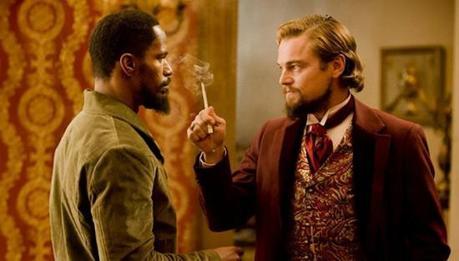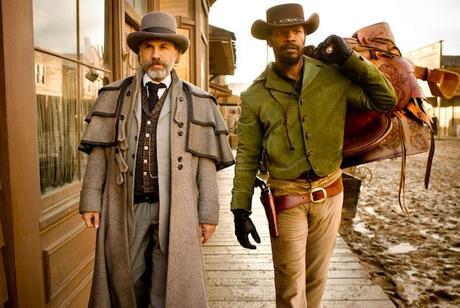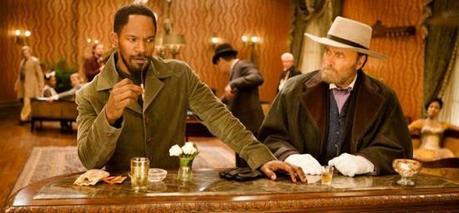
Director Quentin Tarantino has never backed away from the difficult issues surrounding racism. His newest film, Django Unchained, upholds his no-holds-barred approach and leaves nothing to the imagination. The spaghetti western features Tarantino’s trademarks all over as well as an Oscar nominated performance from Christoph Waltz. Despite its length, Django Unchained is one of the most satisfying pictures of 2012.
Django Unchained takes place two years before the Civil War in 1858 and in those days racism was as strong as ever. There are few men who are unaffected by the stigma of race as Dr. King Schultz (Waltz) is a bounty-hunter on a mission. In order to find and kill the men on his bounty, he enlists the help of a slave named Django (Jamie Foxx) then asks for his help in finding the murderous Brittle brothers. The men become partners taking down bounties together. Django’s ultimate goal is to save his long-lost love Broomhilda (Kerry Washington) from an infamous plantation owned by Calvin Candie (Leonardo DiCaprio).
While most westerns tend to avoid racism altogether when it comes to feature films, Tarantino has embraced it here. While at times Django Unchained can be totally gruesome and distasteful the film probably never reaches the pure hatred that was prevalent in America during the 1850′s. Tarantino is more interested in building Django into a hero of justice against various forms of racism than he cares about stepping on somebody’s toes.

There are few directors that can extract career best performances from actors, but Quentin Tarantino has done that with a few of his actors in Django Unchained. While Jamie Foxx, may not have as many speaking lines as either DiCaprio or Waltz, he has a heavy demeanor and much more is said about his character through the various close-ups and psychical actions. Christoph Waltz has once again benefited from the direction of Tarantino. His performance here as Schultz might be a little too similar to his role in Inglorious Basterds, its as though he has stolen the picture away from his co-stars. DiCaprio’s performance might be more notable for him playing against type, but he continues to prove he is A-list caliber with his continued success. Unjustly missed in a lot of the conversation surrounding Django Unchained, Samuel L. Jackson delivers his best performance in years as Stephen, the head house slave. He has strong sense of sustainability and will do anything in order to survive.
Django Unchained has a staggering run-time, heading into the three-hour range, but never feels like it overstays its welcome. While there are some scenes that feel like they should-be left on the cutting room floor (the KKK scene in particular), most of the scenes fit well. There may also be complaints about the movie dragging its feet near the ending. Tarantino obviously knows what he is doing and must’ve felt that lead to the conclusion he envisioned.

Django Unchained is Quentin Tarantino’s strongest film since Kill Bill. While it doesn’t have the directors flair for jumping through various chapters of the story, he could be easily defined as Tarantino’s epic. With its unflinching stance at racism, Django Unchained might not be for everyone, but those who can handle the director’s vision are in for a treat.

